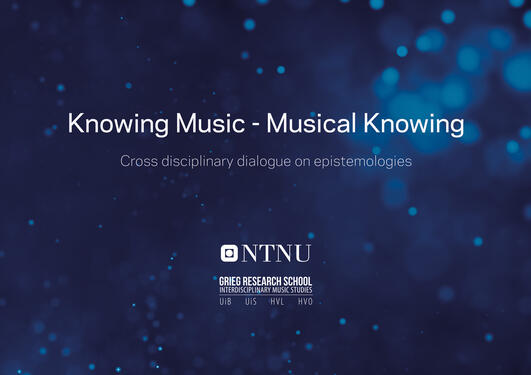Torill Vist
Musical knowing in (arts-based) research
Hovedinnhold
Doing research in the field of music always involves music to some extent – not only in artistic research, but also in qualitative and quantitative projects. Yet, are we explicit about how music is involved in our research and knowledge development, for instance as to how our musical experiences influence and are part of the way we reflect upon our research questions? Are we transparent as to the ways in which music is one of our methodological tools, not only our topic? Elliot Eisner (2008) claims that the arts often have been regarded as ornamental and that in the last decades, their connection to epistemological issues have been weak. If music, as typically written in some curriculums, contains important potentials for knowing and knowledge, and if we agree that music plays a significant role in enlarging human understanding, why should not music and other arts-based processes be considered as important for scientific knowledge development?
When Eisner came up with the term arts-based research, it was as an umbrella, covering different methodological approaches involving the arts, whether the research question was about the arts or other issues. Knowles & Cole define arts-based research as qualitative research that draws inspiration, concepts, processes and representational forms from the arts, exploring the “alternative researching possibilities that fuse the creative and imaginative possibilities of the arts with social science research” (2008, p. xi).
Looking back upon my earlier research from an arts-based perspective, it became clear that I had used arts-based processes without knowing the term and without being explicit about the role music had in my methodologies (Vist, 2015). This keynote will present some examples of such lack of transparency. It will further introduce some important methodologies within arts-based research and discuss some examples of arts-based reflection tools (Vist, 2016), the data gathering method “the aesthetic interview” (Vist, in press), and fictional elements in writing (Vist, 2006).
Key Questions
- Are we explicit about how music is involved in our research and knowledge development, for instance about how our music experience influence – and is part of – the way we reflect upon our research questions?
- Are we transparent about music being one of our methodological tools, not only our topic?
- Which arts-based processes do you use in different phases of your research?
Recommended Reading
Bresler, Liora. (2006). Toward Connectedness: Aesthetically Based Research. Studies in Art Education, 48(1), 52-69.
Rasmussen, Bjørn. (2014). The art of researching with art: Towards an ecological epistemology. Applied Theatre Researcher, 2(1), 21-32.
References
Eisner, E. W. (2008). Art and Knowledge. In J. G. Knowles & A. L. Cole (Eds.), Handbook of the arts in qualitative research: Perspectives, methodologies, examples and issues (pp. 3-12). Los Angeles: Sage Publications.
Knowles, J. G., & Cole, A. L. (2008). Handbook of the arts in qualitative research: Perspectives, methodologies, examples and issues. Los Angeles: Sage Publications.
Vist, T. (2006). Self interview: Relevance in research? In Flerstemmige innspill 2006: en artikkelsamling (pp. 83-91). Oslo: Norges musikkhøgskole.
Vist, T. (2015). Arts-based research in music education: General concepts and potential cases. In E. Georgii-Hemming, S.-E. Holgersen, Ø. Varkøy, & L. Väkevä (Eds.), Nordisk musikkpedagogisk forskning: Årbok 16 [Nordic Research in Music Education: Yearbook Vol. 16] (pp. 259-292). Oslo: NMH.
Vist, T. (2016). Arts-based research processes in ECEC: Examples from preparing and conducting a data collection. Journal Of Nordic Early Childhood Education Research, 13(1), 1-15.
Vist, T. (in press). Toddler Encounters as Aesthetic Interviews? Discussing an Arts-based Data Gathering Qualitative Inquiry. doi:10.1177/1077800418801378
Biography
Torill Vist is today professor in music education at OsloMet – Oslo Metropolitan University, and on leave from a similar position at The University of Stavanger, where she has been working for 23 years. She holds her bachelor and master degrees as well as her PhD in Music Education from the Academy of Music in Oslo, and has another master degree in piano performance from SMU, Dallas. Torill Vist has special research interests in early childhood music education, in music and emotion knowledge, and in arts-based methodologies. Since 2012, she has done methodological studies in arts-based research and developed the data gathering method called “The aesthetic interview” as well as explored music-based (and other arts-based) processes as reflection tools in different phases of research. She has further lectured in several PhD courses and published several articles within the field of Arts-based research.

